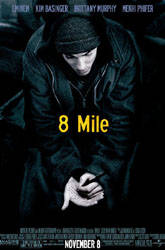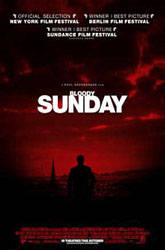 Director: Starring:
OTHER REVIEWS: Crossroads Dancer in the Dark Brown Sugar Amores Perros |
8 Mile BY: DAVID PERRY "The views and events expressed here are totally fucked and are not necessarily the views of anyone. However, the events and suggestions that appear on this album are not to be taken lightly." Rapper Eminem opened his first album, The Slim Shady LP, with that "public service announcement." By taking the time to excuse himself of the controversy that would surely follow his belligerent, antisocial treatise, Eminem showed the parallel between his work and that of, say, an editorial columnist. His viewpoints are exactly that: his. He doesn't expect people to follow his words part and parcel (though some do), but is still going to let it all out for everyone to consume and decide the merits of on their own. I've been sitting the fence on Eminem's artistic abilities for some time: his rants are equally hypnotic for their abrasive stylings and repugnant for their injurious meaning. The pain that he imparts in his songs about his ex-wife comes to life in the words he chooses to describe their relationship; but the way he deals with her, usually involving killing her in some gruesome way, cannot be seen as constructive. His first song to find the balance of pathos and violence needed to create something of perfect poetry (whether or not it created a perfect song is in the eye, or ear, of the beholder) was "Stan," a faux open letter to the fans who were actually living their lives in hopes of being Eminem. As he clearly tries to instruct them (which, as he has found through his career, is something he has more power in doing than their parents), the Slim Shady character who spouts out the misogynistic, anti- establishment, homophobic, racist dialogue is just a singing representation of Eminem (real name: Marshall Mathers -- even the Eminem character is a creation) and his id. After using "Stan" to clear some of the misconceptions, Eminem then used Elton John for a duet on the song. Of course, soon afterwards, he went to trial for attacking Kim Mathers and her new boyfriend, again destroying his attempts to clear his name of the Slim Shady stigma. Hoping that the third time's a charm, Eminem has brought his next clarification to the screen in the form of 8 Mile, a semi-autobiographical tale of his own Rocky-like rise to the top of the rap world. Set in 1995, 8 Mile looks at the life of a wannabe rapper in Detroit trying to make his place in the industry (whether or not he can release an album as successful as The Slim Shady LP four years later is left for the audience to decide). Jimmy Smith, Jr., (Eminem) known by friends and family as Bunny Rabbit, is introduced rehearsing a rap in front of a mirror in a filthy bathroom, people knocking angrily on the locked door and a rap beat permeating the atmosphere. B-Rabbit is at a weekly rap competition where two rappers have 45 seconds to make as many remarks about their competitors and go on to the next round. B-Rabbit is white -- thug white, but still white -- and competitor Papa Doc (Mackie) and jury, the loud audience in the abandoned factory, are all black. Papa Doc immediately gets on this fact and brings the audience to his side; when B-Rabbit gets his turn to mutilate Papa Doc, he freezes and gets the expected audience reaction. "You know that everyone's calling you a loser," his ex-girlfriend Janeane (Manning) tells him. And B-Rabbit is a bit of a loser -- leaving Janeane after she lied about being pregnant, living with his alcoholic mother (Basinger) and her May-December boyfriend Greg (Shannon) in a trailer, losing his job at a pizza place and working at an ex-con-friendly pressing factory. He spends his days hanging out with his friends -- the hopeful Future (Phifer), the jolly Sol George (Miller), the pontificating DJ Iz (Wilson), the slow Chedder Bob (Jones), and the mobile Wing (Byrd) -- before going to a job he hates and a home that hates him. The film itself is not a surprise -- its pretenses are exactly what would expect from Eminem -- but its director is a shock. Curtis Hanson, who did wonders with L.A. Confidential and Wonder Boys, saw something in Eminem that many of his critics were oblivious to: if Eminem can portray his second-self in his albums, what can he do with his first-self on film? Hanson brings production designer Philip Messina (Traffic) and cinematographer Rodrigo Prieto (Amores Perros) to help create the 1990s Detroit in its most devastated form. Looking like a low-income disaster area, the setting of the film helps to show the pitiful world that creates the billowing self-hate that B-Money (i.e. Eminem) is eliciting in his lyrics. This also helps to create the curious impropriety of upper-middle-class suburban kids finding a philosophical union with the world Eminem is rapping against. More amazing, though, is how Hanson et al. are able to find the occasional beauties in this atmosphere. A climactic rap competition has Roman gladiatorial levels of intensity; the odd, counterculture look of Alex (Murphy) has a 'hood glamour that cannot be created on a catwalk; and the friendship that B-Rabbit and his cohorts show is more engaging than anything that might be seen between, say, golfing buddies. At the center of the film, of course, is the work of Eminem, whose hands seem to be on nearly every element of the film. He is a grand screen presence, showing a mile-long stare that breaks through the frame. His acting is not as much of a part of the film as his persona -- after seeing the film, it is impossible to say that Eminem is really a great actor, but the abstract idea of Eminem is unquestionably commanding. His story is, without a doubt, a cinematic one. There
have been countless rags-to- riches stories littering the screens for decades with only
the occasional high points. 8 Mile looks at the formula (at its best was Rocky,
at its worst was Fame) and attempts to portray the rags, not the riches. Nothing
in the film comes without pain and, in the end, it becomes clear that such pain was an
inexorable barrier that had to be broken. 8 Mile's best way to pounce on the
simple clichés it's working with is to leave the audience with a question the film cannot
answer: does breaking these barriers really promise anything? |




